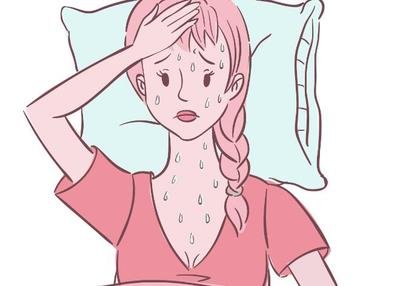
You jolt awake at 3 a.m., not from a dream, but from a sensation. Your pajamas are soaked through, the sheets are clammy beneath you, and a chill runs down your spine despite the fact you feel overwhelmingly hot. It’s the third time this week. You’ve already turned down the thermostat, bought lighter blankets, and blamed the weather. But the drenching night sweats persist.
It’s easy to dismiss it as a stubborn case of being “too hot.” But when these episodes become a regular, sleep-shattering occurrence, it’s a signal you can’t ignore. These night sweats aren’t from heat, your hormones are… waging a war of transition, and your body’s internal thermostat is in open rebellion.
Let’s be clear: these aren’t the mild sweats from a warm room. These are profound, soak-the-sheets episodes that leave you exhausted and frustrated. And for those in their forties, fifties, and beyond, this is often the body’s most dramatic way of announcing that its chemical command center is undergoing a fundamental shift.
The Command Center in Chaos: It’s All About the Hypothalamus
Deep in your brain sits a tiny but mighty region called the hypothalamus. Think of it as your body’s thermostat and control panel for countless automatic functions, including temperature regulation.
This thermostat is finely tuned by your sex hormones—primarily estrogen in women and testosterone in men. These hormones act like the master technicians, ensuring the thermostat gets accurate readings and responds appropriately.
But during perimenopause, menopause, or andropause (the male equivalent), the levels of these technician hormones fluctuate and decline. The hypothalamus, suddenly receiving confusing and inconsistent signals, gets completely mixed up. It mistakenly thinks your body is dangerously overheated and triggers a emergency cooldown: your heart rate increases, blood vessels near the skin dilate, and your sweat glands kick into overdrive. This is the “hot flash” that jolts you awake, leaving you drenched in its wake.
The Prime Suspects: A Hormonal Breakdown
For Women: The Estrogen Rollercoaster
For women, the link between declining estrogen and night sweats is well-established. But it’s not just about low levels; it’s the wild fluctuations during perimenopause that truly confuse the hypothalamus. This isn’t a gentle decline; it’s a dramatic and unpredictable series of surges and drops, and your night sweats are the very damp evidence of that internal battle.
For Men: The Testosterone Taper
Men are not immune. While the change is more gradual, age-related declines in testosterone can lead to similar symptoms. Testosterone plays a key role in regulating the metabolic rate and body temperature. As levels dip, some men experience night sweats, often accompanied by other symptoms like fatigue, irritability, and a decrease in libido.
Beyond Sex Hormones: The Other Chemical Culprits
While sex hormones are the headline act, they aren’t the only players capable of disrupting your internal thermostat.
- The Stress Hormone (Cortisol): Chronic stress keeps your body in a state of “fight or flight,” flooding your system with cortisol. This constant state of high alert can dysregulate your hypothalamus and is a major, often overlooked, trigger for night sweats in both men and women.
- The Thyroid Hormone: Your thyroid gland is the master of your metabolism. An overactive thyroid (hyperthyroidism) revs up all your body’s systems, including your internal furnace. This can lead to heat intolerance and profuse sweating, day and night.
Your Action Plan: From Soggy to Serene
If you’re battling nightly soakings, your mission is to calm the rebellion within.
- Start a Sleep Log: Note the frequency and severity of your night sweats. Also track your diet, alcohol intake, and stress levels. This can help you and your doctor identify patterns.
- Talk to Your Doctor: This is the most important step. Your doctor can run simple blood tests to check your thyroid, blood sugar, and hormone levels. This rules out other causes and confirms the diagnosis.
- Become a Lifestyle Detective:
- Cool Down: Keep your bedroom cool. Use moisture-wicking bedding and pajamas made of natural fibers like cotton or bamboo.
- Watch Your Triggers: Spicy food, caffeine, and alcohol, especially in the evening, are common triggers for night sweats.
- Manage Stress: Incorporate stress-reducing practices like deep breathing, meditation, or gentle yoga into your daily routine. Calming your mind can help calm your body’s internal thermostat.
- Discuss Treatment Options: If lifestyle changes aren’t enough, talk to your doctor about solutions. These can range from Hormone Replacement Therapy (HRT) for women and testosterone therapy for men (if levels are clinically low), to non-hormonal medications and certain antidepressants that can reduce the frequency of hot flashes.
Night sweats are more than just an inconvenience; they are a powerful message from your body. They signal that your hormones are in a state of flux, a natural part of the journey for many. By listening to this message, seeking professional guidance, and making targeted lifestyle changes, you can move from feeling like a victim of your own biology to becoming the empowered manager of your health. You can reclaim your sleep, your comfort, and your energy, trading in those raging hormones for restful, dry nights.